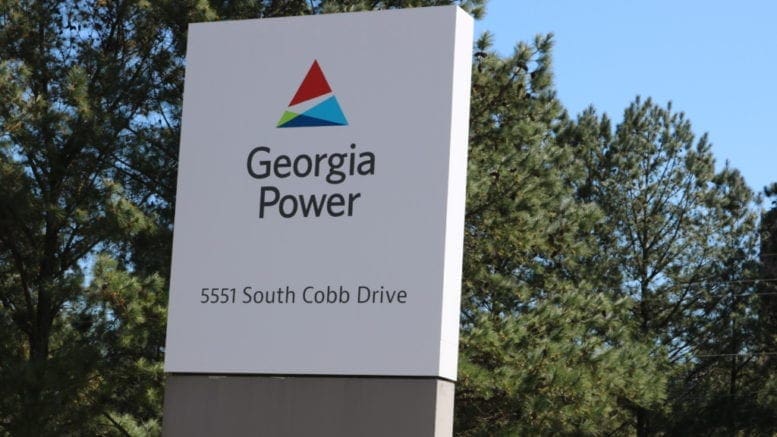by Stanley Dunlap, Georgia Recorder [This article first appeared in the Georgia Recorder, republished with permission]
May 1, 2023
Georgia Power executives predict the nation’s first nuclear plant expansion in over 30 years is just several weeks away from Plant Vogtle’s reactor generating electricity that will meet its customer’s energy demands for decades to come.
Georgia Power and its parent Southern Co. are celebrating the imminent completion of the first of two nuclear units that is scheduled to be up and running by June as the utility company reduces its reliance on fossil fuels in favor of cleaner forms of energy. But the snakebitten $30 billion nuclear expansion that will provide enough power for 500,000 homes and businesses is one of the reasons 2.7 million ratepayers could be saddled with paying $500 more annually on electric bills by 2025, according to clean energy advocates.
This summer, more charges may be added to Georgia Power bills once Vogtle’s Unit 3 is operating and after state regulators rule on the fuel rate case pressed by the state’s largest electricity supplier. If state regulators grant the request, Georgia Power residential customers could pay about $16 more per month over a three-year period starting in June.
According to Georgia Power officials, Vogtle remains on track for Unit 3 to be ready in May or June, and for the final phase to be completed in early 2024 – 12 years after the company unveiled the expansion.
On Monday, a new milestone was reached at Vogtle when the Unit 4 reactor maintained normal pressure levels and temperature during a test run.
“The energy and enthusiasm at the Vogtle site, and across our entire company, is high with Unit 3 in the final stages of startup testing and Unit 4 making progress towards safely loading fuel,” said Kim Greene, chairman, president and CEO of Georgia Power.
“It’s incredible that these new units will provide our state with zero-emissions energy for the next 60 to 80 years, and that’s thanks to the dedication of the teams at the site to getting these units built, and built right,” Greene said.
Meanwhile, state regulators are scheduled to hold hearings Tuesday and Wednesday on Georgia Power’s request to recover excess fuel expenses after inflation drove natural gas prices soaring in the past year.
Bryan Jacob, solar program director of the Southern Alliance for Clean Energy said that ratepayers should not be forced to eat the entire bill because Georgia Power grossly underestimated fuel prices. The extra costs will pile on top of further hikes to cover for Vogtle expected over the next two years. Vogtle’s expansion construction costs are expected to rise to more than $30 billion, up from an initial estimate of $14 billion in 2012.
“Georgia Power makes resource decisions, but ratepayers bear the risk if the utility’s fuel cost projections are wrong,” Jacob said. “Adding insult to injury, Georgians already face the 8th highest electricity bills in the country.”
The five-member Georgia Public Service Commission is scheduled to vote on Georgia Power’s fuel rate case on May 16. Under current state law, unless power companies’ charges are illegal or negligent, commissioners have little control over how much they are reimbursed.
Georgia Power spokesman John Kraft said the company is looking to balance out the prior and future fuel expenses by spreading the payments out over three years instead of two.
“At Georgia Power, we understand that energy costs are an important part of every family’s and business’ budget,” he said.
The volatile energy market is a reason why the Clean Energy Alliance and the Sierra Club of Georgia advocate for more investment in solar and other energy sources that don’t require fuel.
Renewable energy firm CEO Brent Alderfer, who is an expert witness for the two nonprofits in the fuel rate case, estimates Georgia Power would save $1 billion on fuel costs over the next three years if solar power accounted for 10% of its grid. But Georgia Power has successfully lobbied the PSC to cap a rooftop solar program at 5,000 households.
The Southern Environmental Law Center estimates that household utility bills will average about $45 more in 2025 over six incremental increases: $16 for electric base rates, $13 for Plant Vogtle, and $16 for fuel recovery.
Georgia Power raised its residential customers’ bills by $3.60 in January as part of a $1.8 billion rate hike that is paying for electric grid upgrades, cleaning up toxic coal ash and retiring coal-fired power plants and expanding its clean energy portfolio.
Georgia Power estimates the cost of coal ash cleanup and environmental compliance could eventually exceed $9 billion.
Georgia Recorder is part of States Newsroom, a network of news bureaus supported by grants and a coalition of donors as a 501c(3) public charity. Georgia Recorder maintains editorial independence. Contact Editor John McCosh for questions: info@georgiarecorder.com. Follow Georgia Recorder on Facebook and Twitter.
